Posts Tagged ‘Technician License’
 Opinions About ARRL Petition to FCC: Expand Technician HF Privileges!
Opinions About ARRL Petition to FCC: Expand Technician HF Privileges!
In this video, I expound on another point of view regarding the ARRL petition to the FCC. The petition requests an expansion of operating privileges of Technician-class operators in the USA. The ARRL believes that giving broader shortwave access, using digital communications, to Technicians, will better entice the Techs to upgrade to General or Amateur Extra. In this video, I discuss this a bit.
If you are wondering why I’ve made a few videos about this topic, when the topic has been the hot item on many forums already, I believe that the drama will not cease until well after the FCC makes a decision, because this is a relevant topic, and one that has a significant impact on the amateur radio community at large. It is not a trivial conversation about which type of coax is best suited for Arctic field activity.
After some replies came from various viewers, I clarify my point. I stand corrected.
I failed to mention that there are a limited few slices of VOICE (SSB) spectrum on HF that the petition seeks for the Tech licensee. The ARRL states, “ARRL has asked the FCC to expand HF privileges for Technician licensees to include limited phone privileges on 75, 40, and 15 meters, plus RTTY and digital mode privileges on 80, 40, 15, and 10 meters.”
More specifically, “ARRL proposes to provide Technician licensees, present and future, with phone privileges at 3.900 to 4.000 MHz, 7.225 to 7.300 MHz, and 21.350 to 21.450 MHz, plus RTTY and digital privileges in current Technician allocations on 80, 40, 15, and 10 meters. The ARRL petition points out the explosion in popularity of various digital modes over the past 2 decades. Under the ARRL plan, the maximum HF power level for Technician operators would remain at 200 W PEP. The few remaining Novice licensees would gain no new privileges under the League’s proposal.” Reference: http://www.arrl.org/news/arrl-requests-expanded-hf-privileges-for-technician-licensees
My point holds: give some reason to desire to upgrade to a higher class. Do this by granting HF operations on lower bands (lower in frequency than 10 Meters), with more than a CW-only privilege.
If a tech can only use CW on 80m, but doesn’t know CW, then it is likely she won’t ever try making contacts on 80m. Hence, no exposure to the magic of 80-meter DX. If, however, the Tech can dabble with digital or limited SSB, on 80m, then she gets a real, practical exposure to the magic, and may well upgrade. Why do you think a General, who has limits, would ever upgrade? What am I missing here?
The following video expands this idea:
[embedyt] https://www.youtube.com/watch?v=83I3EEQxfZA[/embedyt]
The truth is, I see a strong argument for just ONE license, permanent. Or a temporary entry-level training ticket, then the permanent. But, that would make us like some other countries. That can’t be good.
The original video to which this new video continues is here:
[embedyt]https://www.youtube.com/watch?v=BWSAvDWE3Js[/embedyt]
Some viewers are asking me why I am making a video while driving. They try to convince me that talking while driving is too distracting. My answer is here:
[embedyt]https://www.youtube.com/watch?v=pyNHKViyCGE[/embedyt]
73 de NW7US
 Where are Those New Hams Coming From?
Where are Those New Hams Coming From?
The Tri-Lakes Monument Radio Association just completed another successful Technician license class resulting in 21 new Technicians plus one person that passed both the Technician and General exams. We survey the class a week or two later to get their feedback and capture some demographic information. In recent years, our Technician class has consistently filled to capacity, causing us to ask the question “Where are those new hams coming from?”
The key relevant question on the survey is:
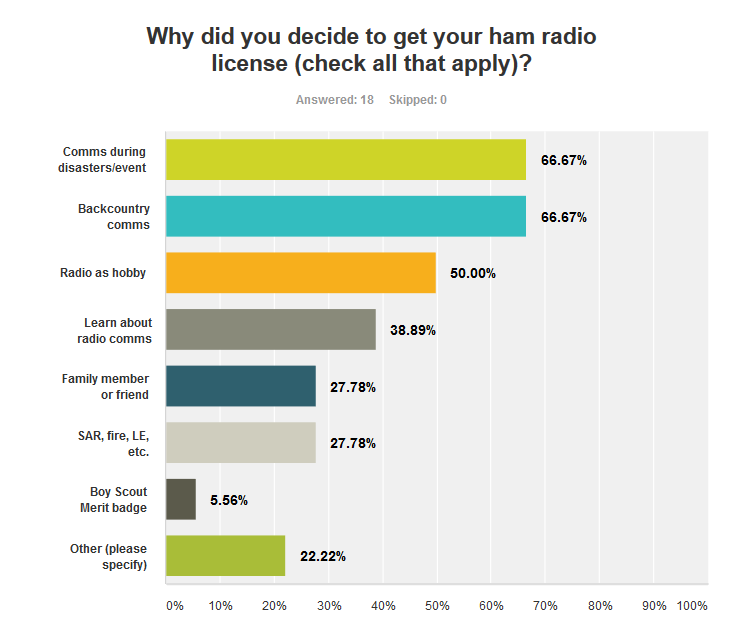 I’ve abbreviated the response choices so they read better on the graph. For example, “Comms during disasters/event” actually says “For communications during disasters or other major events” on the survey. These 18 responses represent over half of the students so they are representative of the class. However, it is a small sample size overall, representing just one class at one time at one location in the US. I will add that the surveys from our other classes are similar.
I’ve abbreviated the response choices so they read better on the graph. For example, “Comms during disasters/event” actually says “For communications during disasters or other major events” on the survey. These 18 responses represent over half of the students so they are representative of the class. However, it is a small sample size overall, representing just one class at one time at one location in the US. I will add that the surveys from our other classes are similar.
The two highest responses, both with 67%, are Comms During Disasters/Event and Backcountry Comms. It was no surprise that communications during a disaster would be a prime motivation for getting a ham radio license. Per FCC Part 97, this is one of the stated purposes of the Amateur Radio Service. Here in Colorado, many people have had the recent experience of wildfires disrupting communications causing them to look for alternatives. In general, the prepper movement is causing people to think in terms of disaster preparedness. Communications in the backcountry includes hikers, climbers, fishermen, dirt bike riders, four-wheel drive enthusiasts and anyone who spends time in the mountains. There are many locations in Colorado that don’t have cellphone coverage, so people are looking for alternative communications. This is likely a regional phenomenon…I don’t think you’d see “backcountry communications” on the short list of amateur radio interest is downtown Chicago.
Radio as a hobby gathers 50% of the responses, followed by 39% interested in learning about radio communications. This says that about half of the students are pursuing ham radio as a hobby. I wonder if this is different that the historical average from 20 years ago? I suspect it used to be higher but I don’t have any data to support that. This would likely be a leading indicator for how many of these new licensees get deeply involved in ham radio activities. I have seen students start out with a narrow focus on emergency preparedness but then discover there’s a lot more to ham radio that they choose to pursue.
What do you think about these results?
73, Bob K0NR
The post Where are Those New Hams Coming From? appeared first on The KØNR Radio Site.
 Announcing: Technician License Class (Black Forest, CO)
Announcing: Technician License Class (Black Forest, CO)
 Ham Radio Two-Day License Class
Ham Radio Two-Day License Class
Sat Feb 27 and Sat Mar 5 (8 AM to 5 PM) 2016
Location: Black Forest Fire Station 1, Black Forest, CO
The Technician license is your gateway to the world-wide excitement of Amateur Radio …
- Earn your ham radio Technician class radio privileges
- Pass your FCC amateur radio license exam right in class on the second day
- Multiple-choice exam, No Morse Code Required
- Live equipment demonstrations
- Learn to operate on the ham bands, 10 Meters and higher
- Learn to use the many VHF/UHF FM repeaters in Colorado
- Find out how to participate in emergency communications
There is a non-refundable $30 registration fee for the class ($20 for students under 18).
In addition, students must have the required study guide and read it before attending the two-day class: HamRadioSchool.com Technician License Course $20.95
(make sure you get the most recent edition of this book, updated for the new FCC exam questions)
Advance registration is required (no later than one week before the first session, earlier is better! This class usually fills up weeks in advance.)
To register for the class, contact: Bob Witte KØNR
Email: [email protected]
Sponsored by the Tri-Lakes Monument Radio Association
For more information on amateur (ham) radio visit www.arrl.org or www.wedothat-radio.org
The post Announcing: Technician License Class (Black Forest, CO) appeared first on The KØNR Radio Site.
 Kids are Not the Future of Ham Radio
Kids are Not the Future of Ham Radio
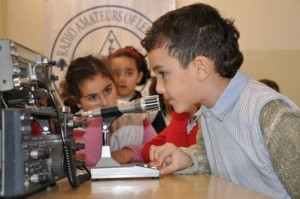 You’ve heard it a million times: our kids are the future. That statement gets applied to almost everything, including amateur radio. How can you argue with an obvious fact like that?
You’ve heard it a million times: our kids are the future. That statement gets applied to almost everything, including amateur radio. How can you argue with an obvious fact like that?
But I am starting to think it is incorrect.
We’ve had really good success on creating new hams of all ages in our Technician License Class (at the Tri-Lakes Monument Radio Association). We’ve been doing this for a while now and I think I am seeing a pattern emerge. We’ve been able to attract middle schoolers to the class and help them get their ham radio license. I’ve talked to many of them on the air. They’ve helped out with public service events. They seem to have fun playing with radios.
Then this thing called high school happens. The high school phase in the US is filled with tons of stuff to do: studying, homework, AP classes, science competitions, sports, dating, movies, driving and after school jobs. Way too much stuff. Ham radio starts to take a backseat to these normal high school activities. Then we don’t see the kids at the radio club meetings or chatting on the local repeater because they are busy doing other things. Have we lost them forever? Not sure.
High school is often followed by college which has its own set of challenges: a totally new environment, away from home, a new set of people, new studies, etc. There might be a ham radio club on campus but maybe not. If a kid is not off to college they are (hopefully) out doing something to establish themselves in this world. Eventually they emerge on the other side, get a job, get themselves established, sometimes with a spouse and maybe a kid or two. By this time they are 25 to 30 years old, depending on the individual.
I recently posted about the demographics of our students in the Tech License Class. The chart below shows the age distribution of our students from our most recent class. Hmmm, clearly most of our students are 30 or older. (Sorry, we have not collected age data with finer resolution.) This particular class is light on the under 18 crowd…sometimes we have a clump of kids in the mix.
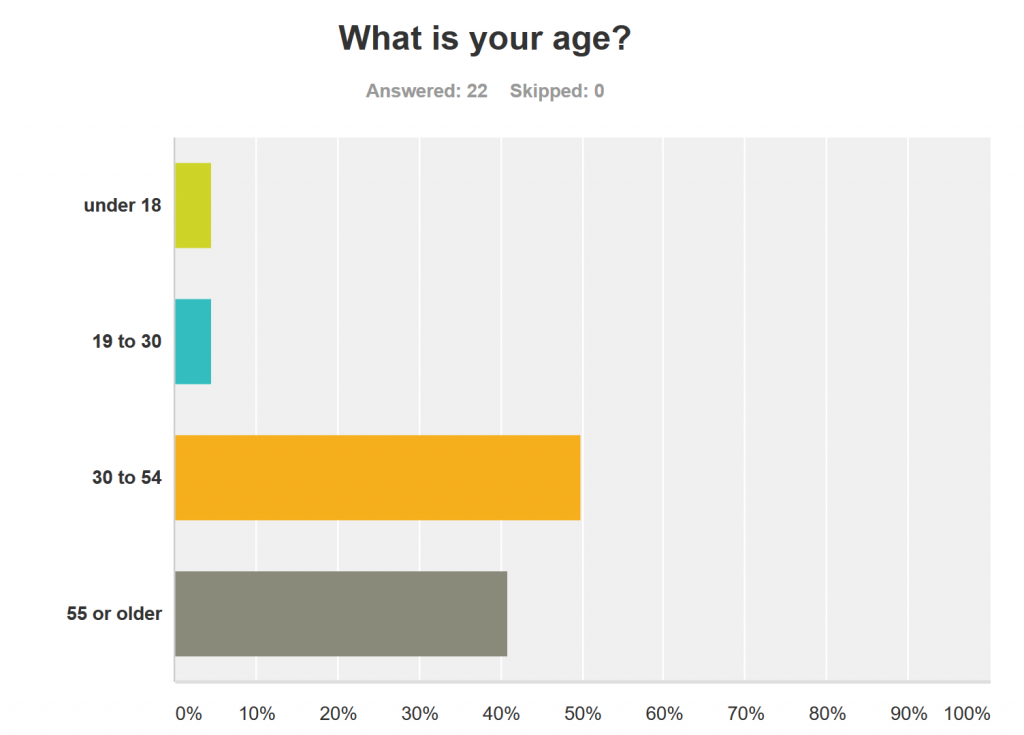 For whatever reason, it seems that most people find themselves in a situation as an adult that causes them to say “I want to get my ham radio license.” When asked why they want to get their ham license, the top response is always emergency/disaster communications, followed by backcountry communications, pursuing electronics as a hobby and learning about radio communications. I suspect that starting to be established in a community and having some disposable income also play a role.
For whatever reason, it seems that most people find themselves in a situation as an adult that causes them to say “I want to get my ham radio license.” When asked why they want to get their ham license, the top response is always emergency/disaster communications, followed by backcountry communications, pursuing electronics as a hobby and learning about radio communications. I suspect that starting to be established in a community and having some disposable income also play a role.
My hypothesis is that the most effective way of growing a vibrant ham radio community is to target adults ages 25 to 40.
This age range is more equipped and ready to be ham radio operators and are still young enough that they will be around for a while. Of course, we still want to work with all age groups, including kids and retirees. We’ve all seen very young hams get the bug for ham radio early and carry it throughout their life. And we also see plenty of older folks get interested in the hobby as they approach or enter retirement. We don’t want to miss out on either of those groups.
So that’s my read on the situation. I’ve got some data to support my theory but I can’t really prove it. What do you think? What are you seeing in your ham radio community?
73, Bob KØNR
The post Kids are Not the Future of Ham Radio appeared first on The KØNR Radio Site.
 Where Are The New Technicians Coming From?
Where Are The New Technicians Coming From?
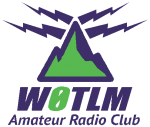 We just wrapped up our Technician license class sponsored by the Tri-Lakes Monument Radio Association. Thirty people took the Technician exam with 27 passing (90%). Four people went on to pass the General exam.
We just wrapped up our Technician license class sponsored by the Tri-Lakes Monument Radio Association. Thirty people took the Technician exam with 27 passing (90%). Four people went on to pass the General exam.
We offer the class twice per year and it always fills to capacity. Invariably, we wonder “where are these new hams coming from?” and instituted a survey to try to find out. Here’s the data from the most recent class, which is typical of previous classes.
Demographics
The class was almost all male (90%) and mostly above the age of 30. From time to time, we’ve had groups of Boy Scouts come through the class which shifts the age profile a bit lower.
 We ask about how they found out about the class. These responses overlap so we have them check all that apply. Most of these people find out about the class through normal “ham radio channels”, including the ARRL web site. A few people in the “other” category mentioned notices published in local weekly newspapers.
We ask about how they found out about the class. These responses overlap so we have them check all that apply. Most of these people find out about the class through normal “ham radio channels”, including the ARRL web site. A few people in the “other” category mentioned notices published in local weekly newspapers.
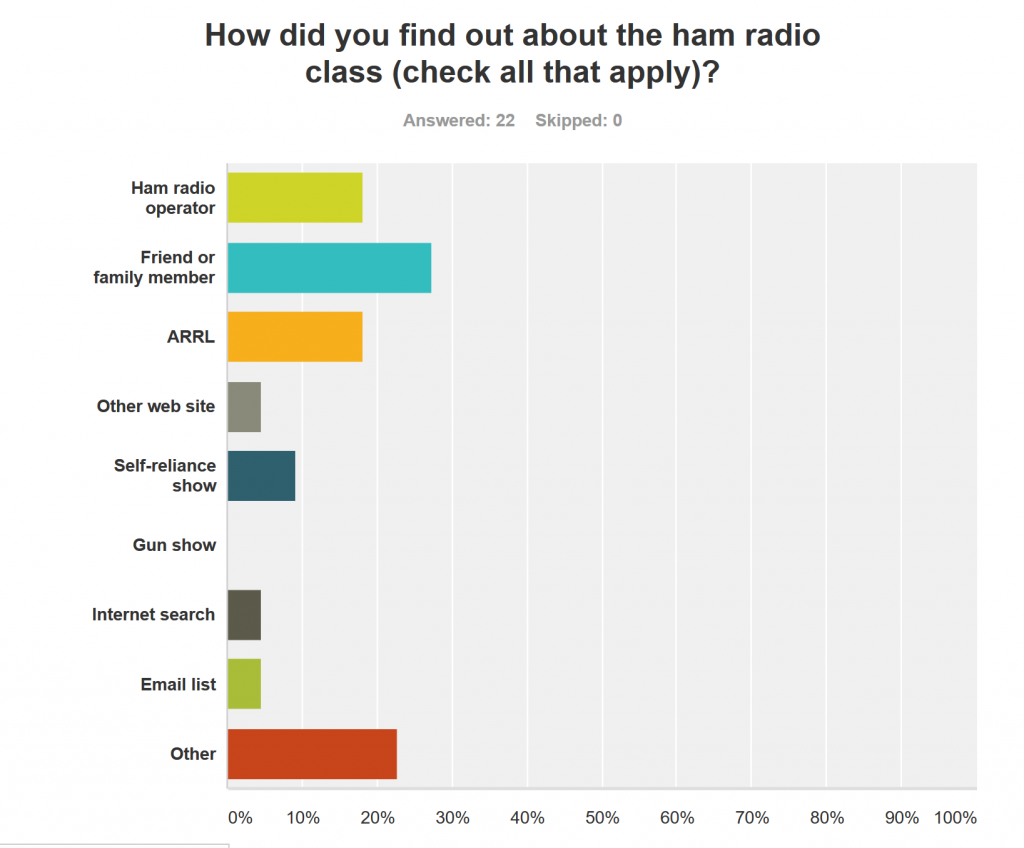 Here’s where it gets interesting. Why do they want to get their amateur radio license? Disaster and emergency communications continues to be the most common answer at almost 90%. This is followed by the closely-related Backcountry/Remote Communications (about 80%). About 60% of the respondents selected radio and electronics as a hobby. More than half said they want to learn about radio communications.
Here’s where it gets interesting. Why do they want to get their amateur radio license? Disaster and emergency communications continues to be the most common answer at almost 90%. This is followed by the closely-related Backcountry/Remote Communications (about 80%). About 60% of the respondents selected radio and electronics as a hobby. More than half said they want to learn about radio communications.
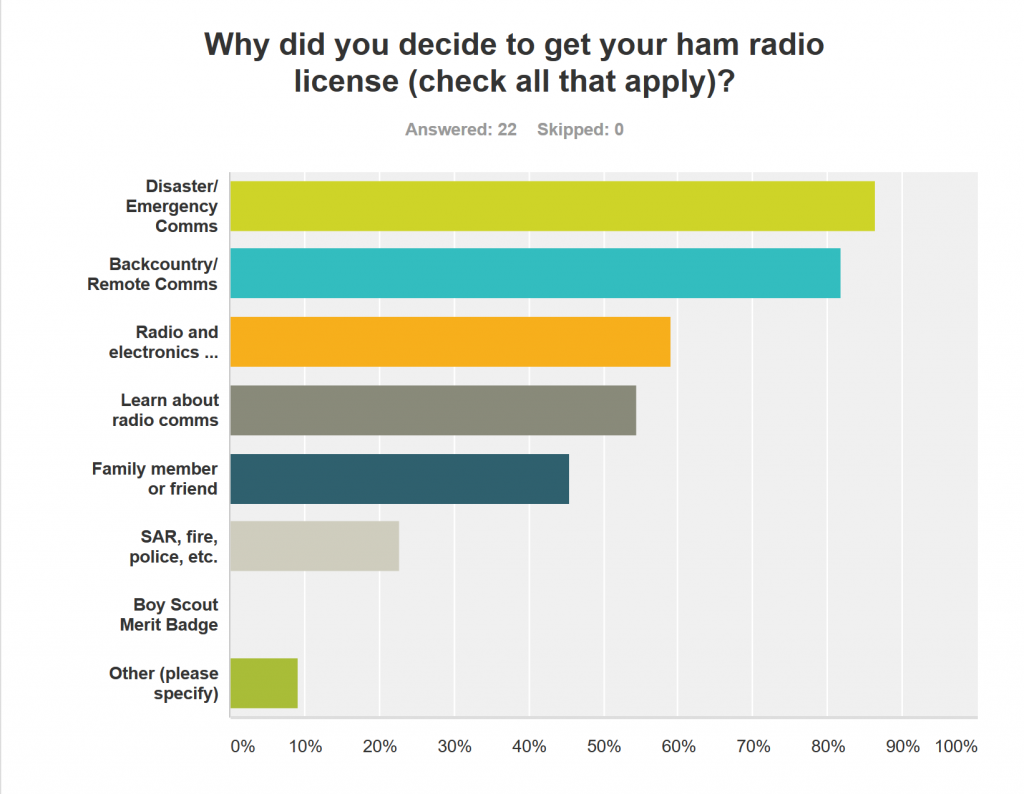 Not to be overlooked is the influence of family and friends at 45%. We often see family members of current radio hams that were
Not to be overlooked is the influence of family and friends at 45%. We often see family members of current radio hams that were badgered encouraged to get their radio license. We do see more than 20% that see a ham radio benefit to their involvement with fire, search and rescue, law enforcement and similar agencies.
Summary
Emergency and disaster preparedness rank high in the reasons why these people are interested in amateur radio. This may be fueled locally due to the recent devastating wildfires in Colorado. Many people experienced first hand what happens to the mobile phone and landline systems when disaster strikes. When All Else Fails. The other major motivation is the traditional hobby aspect of amateur radio. People like to learn about technology and have fun experimenting with it. Lately, this has taken the form of the Maker Movement.
73, Bob K0NR
The post Where Are The New Technicians Coming From? appeared first on The KØNR Radio Site.
 Announcing: Oct 2015 WØTLM Technician License Class
Announcing: Oct 2015 WØTLM Technician License Class
 Ham Radio Two-Day License Class
Ham Radio Two-Day License Class
Sat Oct 3 and Sat Oct 10 (8 AM to 5 PM) 2015
Location: Black Forest Fire Station 1, Black Forest, CO
The Technician license is your gateway to the world-wide excitement of Amateur Radio …
- Earn your ham radio Technician class radio privileges
- Pass your FCC amateur radio license exam right in class on the second day
- Multiple-choice exam, No Morse Code Required
- Live equipment demonstrations
- Learn to operate on the ham bands, 10 Meters and higher
- Learn to use the many VHF/UHF FM repeaters in Colorado
- Find out how to participate in emergency communications
There is a non-refundable $25 registration fee for the class.
In addition, students must have the required study guide and read it before attending the two-day class: HamRadioSchool.com Technician License Course $20.95
(make sure you get the most recent edition of this book, updated for the new FCC exam questions)
Advance registration is required (no later than one week before the first session, earlier is better! This class usually fills up weeks in advance.)
To register for the class, contact: Bob Witte KØNR
Email: [email protected] or Phone: 719 659-3727
Sponsored by the Tri-Lakes Monument Radio Association
For more information on amateur (ham) radio visit www.arrl.org
The post Announcing: Oct 2015 WØTLM Technician License Class appeared first on The KØNR Radio Site.
 Explaining Standing Waves
Explaining Standing Waves
When we teach the Technician License Class, we provide a simple explanation of Standing Wave Ratio (SWR) that emphasizes the concept of impedance matching. An SWR of 1:1 is a perfect match; anything higher is less than perfect.
SWR is an important amateur radio concept, one that is not that easy to explain so I am always on the lookout for training materials. HamRadioNow just republished this video of excellent standing wave demonstration by Bill Hays, AE4QL. Bill actually goes well beyond just standing waves and shows some antenna and transmission line theory as well.
If you just want to learn about standing waves and basic antenna radiation, view the first 35 minutes. After that, it starts to get a little deep.
Grab a cup of your favorite beverage, settle in and get ready to learn from this video.
73, Bob K0NR
The post Explaining Standing Waves appeared first on The KØNR Radio Site.












